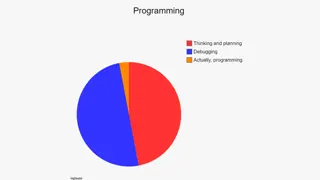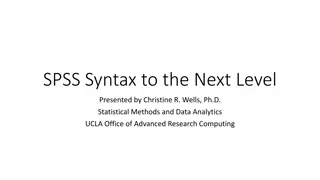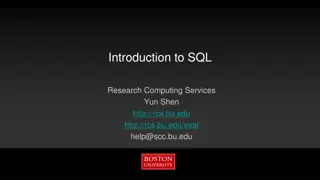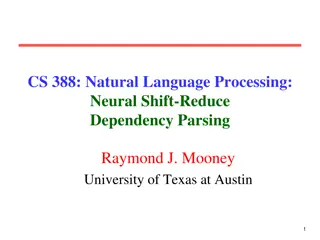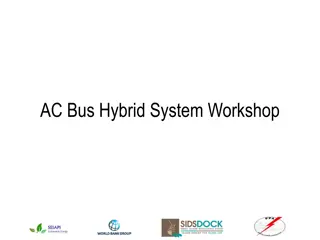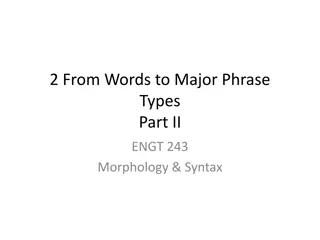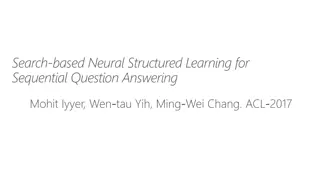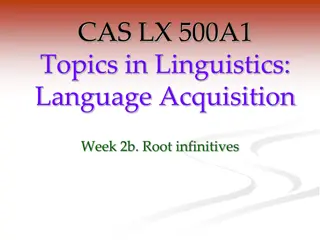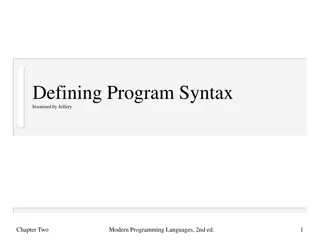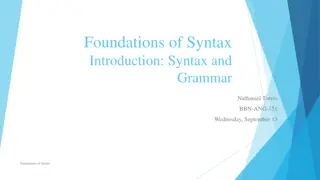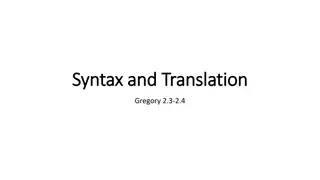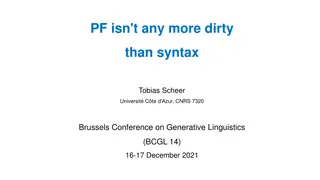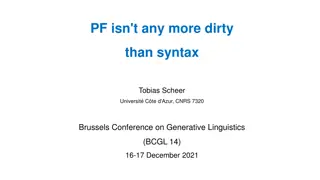Bison Parser Generator and Syntax Rules
In this detailed overview, we delve into the Bison parser generator, its history, functionality, and syntax rules. Learn about Bison 1985, a part of the GNU project, and its compatibility with flex LALR(1) parser generator. Explore the input file syntax, rule syntax, and how to define terminals and non-terminals. Dive into the intricacies of grammar rules in C/C++ code fragments and the process of creating a parser using Bison. Gain insights into the structure of Bison rules for non-terminals and how to construct different sequences effectively.
Download Presentation

Please find below an Image/Link to download the presentation.
The content on the website is provided AS IS for your information and personal use only. It may not be sold, licensed, or shared on other websites without obtaining consent from the author.If you encounter any issues during the download, it is possible that the publisher has removed the file from their server.
You are allowed to download the files provided on this website for personal or commercial use, subject to the condition that they are used lawfully. All files are the property of their respective owners.
The content on the website is provided AS IS for your information and personal use only. It may not be sold, licensed, or shared on other websites without obtaining consent from the author.
E N D
Presentation Transcript
Cecko Assignment 2 Parsing NSWI098 Compiler Principles David Bedn rek 1
bison bison 1985, part of the GNU project based on yacc (yet another compiler-compiler, 1975) compatible with flex LALR(1) parser generator
bison bison 1985, part of the GNU project based on yacc (yet another compiler-compiler, 1975) compatible with flex LALR(1) parser generator Input caparser.y Configuration (do not touch!) Declarations of terminals (do not touch!) Terminal names start with uppercase Declarations of semantic types for non-terminals (not used in Assignment 2) Non-terminal names start with lowercase The grammar C/C++ code fragments (not used in Assignment 2) Output (in modern C++ mode) caparser.hpp Declarations of make_T functions for terminals Declaration of the parser class caparser.cpp Implementation of the parser class Essentially an interpreter of LALR(1) Action/Goto tables Contains user-defined C/C++ code fragments
bison Input file syntax The language supports both /*...*/ and //... comments The first section is line-oriented // switches and definitions %code requires { // this code is emitted to the .hpp file } %code { // this code is emitted to the beginning of the .cpp file } // declarations of terminals and their semantic types // the strings are used in syntax-error messages generated by the parser %token EOF 0 "end of file" %token LBRA "[" %token<int> INTLIT "integer literal" // declarations of semantic types of non-terminals (not used in Asgn. 2) %type<casem::ArgList> argument_list %% // grammar rules %% // this code is emitted to the end of the .cpp file
bison Rule syntax All rules for a non-terminal usually concentrated in one place Right-hand-side parts separated by | This is not a regular expression, just a list of sequences Empty RHS is either just empty or contains the %empty metasymbol A (multi-)rule may be arbitrarily spread on multiple lines The syntax includes : and ; stmt: IF LPAR expr RPAR stmt | IF LPAR expr RPAR stmt ELSE stmt | WHILE LPAR expr RPAR stmt | RETURN INTLIT SEMIC ; The order of rules is not significant The initial nonterminal of our grammar is named translation_unit Defined by the %start switch Inclusion of the EOF terminal in the terminal rule is not required
bison bison is a LALR(1) parser generator bottom-up analysis based on item automaton Built-in rules to resolve conflicts based on explicitly declared priority/associativity of terminals as operators if priorities not defined, favor shift over reductions it simplifies grammars of simple languages, dangerous in more complex cases Forbidden in home assignments Understanding conflicts Since version 3.7.0, bison can display counterexamples for conflicts: This is not necessarily the only or the smallest counterexample solution/caparser.y: warning: shift/reduce conflict on token "else" Example: "if" "(" expr ")" "if" "(" expr ")" stmt "else" stmt Shift derivation stmt 3: "if" "(" expr ")" stmt 4: "if" "(" expr ")" stmt "else" stmt Reduce derivation stmt 4: "if" "(" expr ")" stmt "else" stmt 3: "if" "(" expr ")" stmt All versions produce a human-readable dump of the item automaton <build-folder>/stud-sol/caparser.y.output
bison Example 1 - an ambiguous grammar Grammar part dumped in the .output file: 3 stmt: "if" "(" expr ")" stmt 4 | "if" "(" expr ")" stmt "else" stmt 5 | "while" "(" expr ")" stmt 6 | "return" "integer literal" ";" The corresponding counterexample: Example: "if" "(" expr ")" "if" "(" expr ")" stmt "else" stmt Shift derivation stmt 3: "if" "(" expr ")" stmt 4: "if" "(" expr ")" stmt "else" stmt Reduce derivation stmt 4: "if" "(" expr ")" stmt "else" stmt 3: "if" "(" expr ")" stmt The counterexample shows that the word "if" "(" expr ")" "if" "(" expr ")" stmt "else" stmt can be derived by two different derivations from the same stmt nonterminal applying rule 3, then rule 4 applying rule 4, then rule 3 (on the first occurrence of stmt) The grammar ambiguity causes a shift-reduce conflict: after parsing the nested stmt nonterminal, looking ahead to the "else" terminal This particular problem shall be solved by rewriting the grammar unambiguously
bison Example 2 - a LALR(1) conflict The grammar is not ambiguous but it does not satisfy the LALR(1) conditions 7 expr: "integer literal" 8 | "identifier" 9 | "(" typename ")" expr 10 | "(" expr ")" 11 typename: "identifier" The counterexample produced by bison is too long, this is manually simplified: First reduce derivation expr 10: "(" expr ")" 8: "identifier" Second reduce derivation expr 9: "(" typename ")" expr 11: "identifier" In this case, there are two different words derived from expr "(" "identifier" ")" "(" "identifier" ")" expr The two words have a common prefix (shown by the position of the dot) The look-ahead terminal after that dot is also the same The two derivations use different rules just before the dot The parser can't tell which rule to use for reducing the text before the dot This is termed a reduce-reduce conflict
bison Example 2 - a LALR(1) conflict The conflict is also visible in the .output file: State 29 conflicts: 1 reduce/reduce The corresponding state is dumped in the same file as: The LR(0) items forming the state: 8 expr: "identifier" 11 typename: "identifier" The corresponding actions for this state: ")" reduce using rule 8 (expr) ")" [reduce using rule 11 (typename)] $default reduce using rule 8 (expr) In this case, there are two possible actions for the same look-ahead of ")" The action shown in [brackets] is suppressed by some built-in conflict resolution rules The $default look-ahead means "in all other cases" If you don't understand how/why this state was produced, trace it back: Try to find the text "state 29": State 23 9 expr: "(" typename ")" expr 10 | "(" expr ")" "(" shift, and go to state 23 "identifier" shift, and go to state 29 "integer literal" shift, and go to state 25 expr go to state 30 typename go to state 31
bison Example 2 - a LALR(1) conflict State 23 9 expr: "(" typename ")" expr 10 | "(" expr ")" The dump does not show the closure items, but it shows the actions resulting from them: "(" shift, and go to state 23 "identifier" shift, and go to state 29 "integer literal" shift, and go to state 25 Because the dots are before non-terminals, there are also the gotos: expr go to state 30 typename go to state 31 State 29 8 expr: "identifier" 11 typename: "identifier" ")" reduce using rule 8 (expr) ")" [reduce using rule 11 (typename)] $default reduce using rule 8 (expr) In this case, the State 23 and the shift action to the State 29 is sufficient for understanding the problem In more complex cases, it may be necessary to trace back more states In theory, tracing every path back to the initial state will produce the language of all counterexamples for State 23
bison Example 2 - a LALR(1) conflict The underlying cause of this conflict is the fact that these two expressions (x) (x)y have the same prefix but the meaning of x is completely different In theory, it could be handled by massively rewriting the grammar like expr: expr_or_typename | expr_not_typename ; expr_not_typename: INTLIT | LPAR expr_or_typename RPAR expr | LPAR expr_or_typename RPAR | LPAR expr_not_typename RPAR ; expr_or_typename: IDF ; typename: expr_or_typename ; expr_or_typename describes the intersection of the two languages produced from the expr and typename nonterminals expr_not_typename describes the set-difference of the two languages typename_not_expr would be empty in this grammar Although there still are the two words having the same prefix, all the reduction required before applied inside the In the real C language, such a rewrite does not solve all the conflicts...
Cecko The real situation in C/C++ The following text (inside a function body) x(*y); may be a statement containing a function call applied to a pointer dereference may be a declaration of variable y as a pointer to the type x the parentheses are superfluous but allowed The grammar is really ambiguous between declarations and statements Trying to solve this ambiguity by rewriting the grammar is a nonsense Even if the rewrite was successful, the semantic analysis would be almost impossible The ambiguity is solved with the help of semantic information At the input to parsing, the compiler must distinguish between identifiers of types and identifiers of everything else The language reference manual explicitly states this This is also the reason for the typename keyword inside C++ templates It is implemented by looking into symbol tables between lexical analysis and parsing In our case, you have to implement it inside the calexer.lex file: ctx->is_typedef(yytext) will tell you whether yytext was declared as a type identifier (i.e. by typedef) if true, call make_TYPEIDF instead of make_IDF Testing: Our compiler has a built-in library containing the type identifier FILE Note: Interacting with symbol tables in lexer is potentially dangerous: typedef struct { /*...*/ } x; x(*y); Are you sure that the symbol tables already contain the first declaration when the second x is lexically analyzed? The parser has a look-ahead! More on that in Assignment 3. In the grammar, use TYPEIDF where identifier of a type is expected
Cecko At the input to parsing, the compiler must distinguish between identifiers of types and identifiers of everything else ctx->is_typedef(yytext) if true, call make_TYPEIDF instead of make_IDF In the grammar, use TYPEIDF where identifier of a type is expected This is actually only in the typedef-name nonterminal But beware, there are contexts which do not reference plain identifiers: struct/union/enum tag names as in struct x * y; member names as in y->x; newly declared identifiers as in int x; In all these cases, is_typedef provides irrelevant information The grammar must allow both IDF and TYPEIDF in these contexts, like: postfix-expression: postfix-expression ARROW identifier /*...*/ ; direct-declarator: identifier /*...*/ ; identifier: IDF | TYPEIDF ;
Cecko The only context that allows IDF but not TYPEIDF is inside expressions except the type-name in sizeof note: Cecko does not support type casts Problem: primary-expression: identifier | constant /*...*/ ; constant: enumeration-constant /*...*/ ; enumeration-constant: identifier ; This must be resolved similarly to the rewrite shown in Example 2 Separate constant_identifier from constant_not_identifier In primary-expression, merge identifier with constant_identifier Hint: make a comment to remember the merge - it will be useful in semantic analysis The merged identifier referenced here shall allow only IDF, not TYPEIDF


